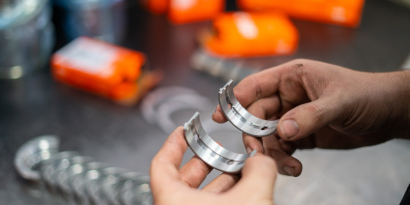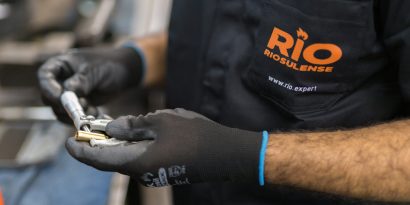Since the release of RIO’s piston rings, the question in the title of today’s post has been repeated many times in workshops, grinders, and auto parts stores that work with our components throughout Brazil and around the world. And, as always, we paid attention to it! That’s why, in this article, we’ve prepared a more conclusive answer and gathered valuable information about these parts to help you, fellow Expert, better understand the root of this issue. Join us!
Understanding the role of piston rings in the engine
If you follow us on our blog, you probably already know that piston rings are extremely critical components in a vehicle’s engine. After all, they are responsible for controlling the flow of oil on the cylinder walls, ensuring compression in the combustion chamber, and dissipating part of the heat generated during the operation of the engine.
The point is that, as we mentioned in another article, this entire process involves delicate precision engineering, which requires maximum compatibility from the rings with the pistons, as this is the only way to ensure the good performance and durability of the engine – a level of compatibility that obviously cannot be guaranteed when we think about piston rings and pistons produced by different brands.
So, the answer is no. Using RIO piston rings with pistons from other brands is not a good idea!
Pistons and rings that do not have compatible dimensions, thicknesses, and resistances may end up wearing out, increasing fuel consumption, reducing vehicle performance, and allowing gases to leak into the crankcase prematurely. And the good reasons for not mixing components from different brands don’t end there:
Design Tolerances: Each piston manufacturer may have unique design specifications for their products, including diameters, thicknesses, heights, and angles. Piston rings are designed to fit perfectly onto corresponding pistons. If one brand’s rings do not meet another brand’s specific design tolerances, they may not fit properly or may cause compression leaks.
Materials and coatings: The materials used in the manufacture of piston rings can also vary from one brand to another. Additionally, some piston rings may have special coatings to improve performance and durability. If materials and coatings are not compatible, this can lead to premature wear, overheating, and other complications.
Thermal compatibility: Piston rings must be designed to handle the high temperatures and pressures inside the engine. If one brand’s rings are not designed to work in conjunction with another brand’s pistons, sealing, and performance problems may occur when the engine is running.
Manufacturing quality and control: The quality of piston rings can vary from one brand to another, and different manufacturers may have different quality control standards. Therefore, using piston rings from an unknown brand or of inferior quality may result in engine reliability and durability issues.
Warranties and responsibility: Finally, you need to bear in mind that mixing parts from different brands can affect the validity of the warranties of one or both manufacturers. If an engine problem occurs and it is determined that the use of non-compatible parts contributed to it, the warranty may be voided — and the Expert will be at risk!
In other words, following the vehicle manufacturer’s specifications and recommendations when choosing replacement parts, including piston rings and pistons, is still the safest path. This ensures proper engine compatibility and performance, as well as helping to maintain any existing warranty.
But don’t worry: At RIO practicality is always the key word!
Let’s face it, with all these compatibility issues in mind, it would be a good idea to receive the corresponding pistons and piston rings at once and, preferably, all in the same packaging, right? It was with this in mind that RIO got its hands dirty and developed the P&A exclusive P&A kit, in which the piston and rings arrive together at the Expert, all in one box: Just open it and apply it to the engine!
Looking for compatible rings and pistons? Checking density, durability, and resistance parameters in each application? With the P&A kit, all of this is gone!
RIO’s entire line of pistons and rings is developed to cope with increases in speed and consequent increases in temperature in the combustion chamber of new generations of engines, meeting the most rigorous requirements of the replacement market and going through rigorous metrology, precision, and quality processes, as we explain in the video below. Check it out:
So just remember: When you choose RIO, that’s the quality you bring to your business – and not just in the piston and ring kits, but also in our entire portfolio of spare parts and engine components!
We hope that today’s article has helped you clear up this doubt once and for all, but of course, if you still need any help, just get in touch with our team or leave your comment here on the blog. Always count on us and see you next time!





